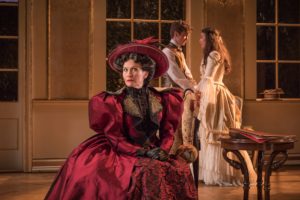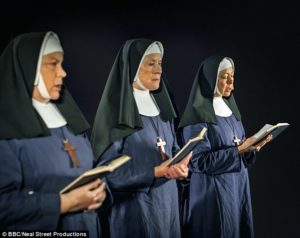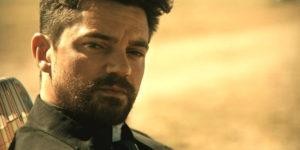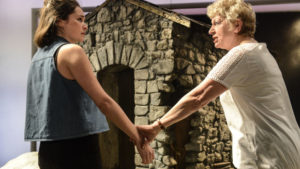 (3 / 5)
(3 / 5)
With another General Election almost upon us, Theatr Clwyd’s staging of My Country seems particularly apt. A political play of sorts, its backdrop is last year’s divisive and historic EU referendum. In the days following the vote, the National Theatre set about touring the nation, interviewing a variety of people to hear their views on the referendum, their town, their country, their lives, and their future. The result is a smorgasbord of opinion, brought brilliantly to life on stage by Director Rufus Norris and Poet Laureate Carol Ann Duffy.
In a similar way to London Road, My Country uses a verbatim script, with Duffy weaving together some wonderfully rhythmic dialogue. She manages to capture the very conflicting and often contrasting views of people extremely well. Using the natural cadence of the English language, she has created a piece of work that is both musical in its tone and voice, and clear in its content and subject matter. It is not burdensome on the listener, with six actors representing six regions of the UK. Each actor plays between eight and twelve characters from their part of Britain. The play can get busy with these various personalities, but thankfully not so busy that one gets lost. Each is brilliantly engaging in their own way: Laura Elphinstone brings a cheeky humour to her North East; Adam Ewan a lovable snobbery to some of his South West folk; and Seema Bowri’s East Midlands characters are charmingly no-nonsense and frank. They complement one another fantastically well. As a cast, they work together brilliantly.
Keeping the six in check is Britannia, played by Penny Layden. Acting as Chairperson, she is a humble yet authoritative character. She enters the room quite ordinarily at the start, in a plain and simple blue suit. Putting down her bag, she clicks on the lights and manoeuvres the seven tables on stage. She greets the audience, then each of the six cast members in turn. They sit at their tables, and she announces the intentions of the meeting in a simple and unassuming way. Then, one by one, they lift up pictures of the people who they are representing – a diverse group that includes some recognisable faces from the political class. When it comes to then recreating their famous speeches, Layden is superb in bringing Boris Johnson, Nigel Farage and David Cameron (to name but three) to life. She not only captures their familiar accents but manages to achieve the individual nuances of their movements and gestures. It is a delight to behold.
Even as she impersonates the Westminster elite with a sense of joviality however, Layden still manages to retain Britannia’s unpretentious and sincere nature. If she were to be too satirical in her performance, the later scenes, holding much more dramatic weight, would perhaps not have worked quite as effectively. Here, there is much more emotional depth. Fractures start appearing. The six on stage start shouting and arguing with each other. Britannia seeks to keep them under control. At one stage, she appears to go through an identity crisis of her own. For a 75-minute production, it manages to say a lot in a relatively short space of time.

Ultimately, this is a play about “the sacrament of listening”. The six actors descend into more bickering and arguing as the play goes on. Britannia has to call them back each time – to “listen” again. They get so caught up in themselves that they forget to listen. We are all the same. It is the reason to feel both heartbroken and ashamed as Christian Patterson, who plays Cymru, assumes the voice of Dylan, a little boy from Merthyr Tydfil. Now and again, above the commotion, he softly speaks: “Be kind… No argues”. But nobody listens to him.
The National Theatre, under the direction of Norris, has undertaken to listen to people from across the country. Duffy has endeavoured to listen with such precision that she has used their exact words to create a multifaceted and beautifully rhythmic script. She has taken their stories and opinions seriously enough to include views from all sides – some funny, some extreme; some uplifting, others uncomfortable. They cannot be accused of being hypocritical in their content. They have listened. They call us to listen to. It is a simple yet powerful message to take away. And one, at this time in particular, that may be worth acting upon.
My Country can be seen at:
Cambridge Arts Theatre
Mon 12 – Sat 17 June 2017
https://www.cambridgeartstheatre.com/whats-on/my-country
Theatre Royal Stratford East
Mon 19 – Sat 24 June 2017
https://www.nationaltheatre.org.uk/shows/my-country-at-theatre-royal-stratford-east
https://www.theatrclwyd.com/en/whats-on/national-theatre-country-work-progress/
Tag Archives: Gareth Williams
Ward Thomas, Cartwheels Tour, The Ritz Manchester by Gareth Williams
Walking the streets of Manchester on Wednesday evening, it felt like any other visit to the city. With the exception of some TV cameras and a clear police presence, it seemed like business as usual for residents, commuters and tourists. Outside The Ritz, the popular music venue opposite Oxford Road station, heightened security meant that each individual was patted down on entrance. Inside though, it was standard procedure – find the bar, grab a drink, and wait for the music to begin.
There was plenty to be inspired by as a visitor to this city, coming less than 48 hours after a terror attack which left 22 dead and dozens injured at the MEN Arena. A spirit of defiance, to not let this savage brutality determine the way people go about their daily lives, was powerfully present, not just in the streets but inside The Ritz too. The decision of country duo Ward Thomas to go ahead with their planned gig here was met with widespread approval. They had postponed the Northampton leg of their Cartwheels tour 24 hours earlier, out of respect for those caught up in Monday’s bombing. Now, it was time to show solidarity with the people of Manchester, to stand together with them, and choose light over darkness and despair.
They opened with a song that, already powerful, took on a much deeper meaning in light of Monday’s event. Sung under ambient lighting, ‘Safe’ speaks of a place of rest, forgiveness and healing. It also features the incredibly moving statement, ‘You are not what happened to you’. It was the perfect song choice. It spoke right to the heart of this musical city. Here, on this night, were words of faith, hope, and love. Then, for a moment, this nightclub venue became a hallowed church: a minute’s silence to remember those who had lost their lives. Throughout the whole evening, as at this moment, the spirit of togetherness was extraordinary. The applause that rang out afterwards only echoed this further. It was all very moving.
After this emotional tribute, Catherine and Lizzy set about performing their planned set. Suddenly, there was a huge explosion of light and colour that hit the stage. In front of a black backdrop dotted with starry lights, the two sisters splashed great energy and enthusiasm over their country rock records. In contrast, their soulful ballads were marked with sweet harmonies and a simple spotlight. In both instances, the audience were full of applause after each song. It felt almost like a statement of intent. This was a celebration of this city’s musical identity. This is taking nothing away from Ward Thomas however. They deserve applause as artists in their own right. With ‘Cartwheels’, they have created a stunningly beautiful album. To become the first UK Country act to reach No.1 with their material is no fluke. These ladies really do deserve all the accolades that come their way. They write such powerful and emotional lyrics. They tell such great stories. There is a profound, and often universal, depth to their songwriting. And they can now add live performance to their ever-growing list of achievements. This concert, at least, was brilliant.
This concert was also inspiring. Ward Thomas played their part (as did Wildwood Kin, who were supporting them) but it was the audience who made this night special. Instead of staying away through fear, they turned up in their numbers. They responded in perhaps the best way one can to such a terrible, fear-inducing event. This simple choice of turning up, of coming together – this community spirit – sent a message. It was a message of hope, of solidarity, and a sign that love remains triumphant over hate. It was a real privilege and a great opportunity to be in the midst of such inspirational people. A moving and life-affirming night.

Review The Importance of Being Earnest, Theatr Clwyd by Gareth Williams

 (4.5 / 5)
(4.5 / 5)
There are certain smells that have the power to transport you to a certain place. Before the action had even started on the stage of the Anthony Hopkins theatre, I found myself standing in the middle of a bookshop, browsing the shelves and in my element. Clearly, the ingredients for the opening scene – consisting of an oak desk, antique tea trolley, red leather sofa and chipped wood wall panelling – had combined to create a most evocative scent. It was the perfect metaphor for my relationship with The Importance of Being Earnest. Suddenly, this play, which I had only previously encountered on paper, was coming to life right before my eyes, and in glorious detail too.
The costume department at Theatr Clwyd has once again excelled in creating the most exquisite outfits. The actors look positively fabulous, and the periodic detail is simply sublime. They capture the regal nature of the Victorian aristocracy perfectly: elegant, smart and, particularly in the case of Lady Bracknell, excessive. The Scenic Artists have clearly been inspired to compliment these gorgeous outfits with some spectacular scenery. In Act II especially, the Manor House garden is breathtaking. With huge green hedges and colourful flower beds, it is a wonder the stage is big enough to fit it all in. It is a real work of art, worthy of a horticultural (never mind theatrical) award.

Thankfully, this colourful production also contains some vibrant acting. It is not just the brilliance of Oscar Wilde’s script that is hugely affecting. The addition of physical expression means that the wit and wisdom contained within it are greatly enhanced. The humour is at times bitingly satirical, at times far more slapstick. Yet whether it is the mannerisms of Matt Jessup as John Worthing, the animated physicality of Nick Harris (Merriman), or the snobbish ignorance with which Hilary Maclean plays Lady Bracknell, this production certainly delivers on comedic value. It is infectiously enjoyable, in part from the fact that the entire cast seem to be taking such pleasure in performing Wilde’s work. They never seem to be overindulging in this opportunity though. They embody their characters brilliantly, and the strength of relationship between them is evident.

This seems a timeless play. One hundred years on, it still feels fresh. I still meet people today who care deeply about their public appearance, their social status and financial expression. It also feels like a timely political play too. One wonders, at least from media portrayals, whether today’s politicians aren’t the spitting image of Wilde’s characters. In both cases, director Richard Fitch has hit on something which makes this production enjoyably and humorously infectious. It is a beautiful production. A treat for the eyes, ears and (for me at least) the nose.
https://www.theatrclwyd.com/en/whats-on/the-importance-of-being-earnest/
Grantchester & the rise of the TV vicar by Gareth Williams
As Grantchester prepares to get underway with its third series on ITV, I felt it would be a good time to reflect on the recent surge in clerical figures appearing on our television screens. Whether in comedy, drama, or documentary, the rise of the TV vicar is very exciting on a personal level. But it does intrigue me that, in this supposed age of secularism in Britain, such men and women of faith are coming to the forefront of British television. They are no longer the bit part players, given only a ceremonial role in soap marriages and funeral services. Instead, TV writers, directors and producers seem to be open to the idea that these men and women of the cloth can actually lead a show. They have entrusted them as protagonists. Praise the Lord!
Any doubts that may have surfaced in the early days of this “revival” must now be put to bed. Gone are the days where the religious output of the BBC was a mere half-hour every Sunday for Songs of Praise, and the obligatory documentary to mark the Christian festivals of Christmas and Easter. Don’t get me wrong, these still exist. Most recently, Fern Britton took a trip to Jerusalem to recount the story of Jesus in Fern Britton’s Holy Land Journey. Moreover, they still have a place within the television schedules. I think the evolution of Songs of Praise to include modern and contemporary Christian music, alongside congregations belting out 19th Century hymns, reveals something of this show’s continued relevance to its watching audience. But the representation of Christians on television is now moving beyond these niche slots to feature in other, more populist, areas of the TV landscape.
Nowhere is this more evident than Sunday nights. It is perhaps apt that the traditional day of worship for Christians should also be the time when two of the biggest contemporary dramas are broadcast, both featuring clerical characters. As mentioned earlier, Grantchester begins its third series on Sunday at 9pm, having previously been broadcast on Mondays (Series 1) and Wednesdays (Series 2), again in a primetime 9pm slot. Who would have thought that a show featuring an Anglican vicar as its protagonist would regularly pull in 6 million viewers? Yes, it taps into the current popularity of murder mystery dramas. But it is not afraid to take seriously the vocation of James Norton’s character. It deals with issues of faith in a very open and unabashed way. The Revd Sidney Chambers is not perfect, and the character himself never claims to be. He wrestles with the conflict and dilemmas that emerge from his faith, sometimes overcoming them and sometimes not. Here is a man who does not think he is better than us (the traditional stereotype of TV satire) but a man who is like us. This empathetic portrayal, I believe, is one of the reasons why the TV vicar is becoming increasingly visible on our screens.
The other big Sunday night draw is the ever-popular Call the Midwife. Broadcast on Sundays since its inception, it remains the highest-rating drama on British television since the turn of the century. And at its heart is a group of Anglican nuns. Writer Heidi Thomas has created such a wonderful drama full of real human stories. Yet she does not shy away from treating the nuns’ faith with the same care and attention as the episodic story arcs of one-off characters. The sisters receive just as much dramatic attention as the nurses that work alongside them, as does the resident vicar Tom Hereward (played by Jack Ashton). There are numerous examples of these faith-filled storylines and, like in Grantchester, the conflicts and desires at the heart of these characters are explored with such depth of care and attention that one cannot fail to empathise with them. As a result, we can begin to understand and take faith more seriously. It is no longer a weird, ancient pastime but lived experience, a legitimate (and complicated) part of a person’s identity.

These are just two examples of the increasing presence of clerical characters on our TV screens. They are by no means alone in the growing pantheon of shows featuring a clerical protagonist. Others include: Welsh-language drama Parch (featuring a female cleric), US fantasy drama Preacher, Sky Atlantic’s The Young Pope (with Jude Law), and BBC daytime series Father Brown. But if you think this list of dramatic representations means the death of the vicar in TV comedy, think again. Recent series such as This Country (BBC3) and Hospital People (BBC1) remind us that they still have a place within the sitcom genre. They can still be figures of fun, much like anyone else. But the sitcom is no longer the only place we find them.

After years of unpleasant stereotyping, in which they have been satirically lambasted, played as figures of ridicule, and been a pointless but necessary figurine at weddings and funerals, it seems that the TV vicar finally has the opportunity to tell their own story. Since the arrival of Rev, the floodgates have opened to allow the small screen cleric some actual and proper screen time. This can only be a good thing, particularly in an increasingly secular culture that views faith with suspicion. So here’s to the rising prominence of Christian clerics on television. May the positive portrayals continue, and may other faith groups follow. (And I raise a glass of whisky – Sidney’s favourite tipple – rather than the stereotypical sherry as I say that.)
Review Scarlett at Theatr Clwyd by Gareth Williams

 (3 / 5)
(3 / 5)
There is much to love in Scarlett. This one act play is short and sweet. Yet don’t think it lacks depth. It tackles issues of identity, family and death in a very humorous and conversational way. Part of its appeal lies in the relationships between the three generations of women onstage – protagonist Scarlett, her daughter Lydia, and her overbearing mother Bette. Scarlett is having some kind of midlife crisis. Or is it? Whatever her reasons, she has decided to travel from London to rural Wales in search of a new place to live. The small stage represents a patch of Welsh countryside, on which sit two rocks and a dilapidated stone building. This building appears to be the perfect place for Scarlett (played by Kate Ashfield) to start a new life for herself. This is in spite of local landowner Eria (Lynn Hunter) insisting it’s a chapel, and Lydia and Bette referring to it as nothing more than a shed.

Writer Colette Kane uses these differences of opinion to create a very witty, sometimes poignant, script. The dialogue is often rapid. The characterisation is scarily familiar. I could see elements of my own family in all three generations of women, yet this only added to the humour. Joanna Bacon is superb as Scarlett’s demanding and self-righteous mother. There is a fierce outer shell yet an inner vulnerability to Lydia which Bethan Cullinane manages to balance effortlessly well. As for Scarlett herself, Ashfield has landed a strong and empowering role. She commands the stage, not imperiously, but simply by embodying the character so well. There is no doubt that this effervescent and strong-willed woman is the central figure in a play that is not afraid to speak plainly about sex, status and self-worth from a wholly-female perspective.
Kane’s script can be very subtle in its character arcs. I say this because the characters can feel fully formed when we first meet them, yet over the course of the play, there is a change in their outlook and perspective. This is not always obvious. Sometimes, the change is too subtle. When the lights came up and the cast took their bows, I admit that I was slightly surprised. I was expecting an interval, to stay with these characters beyond 75 minutes. It is testament to Kane that they became so familiar and likeable, yet I couldn’t help feeling that there was more of their story to tell. As a result, I left feeling slightly dissatisfied: not what I wanted to feel.
Scarlett is a play hardwired in reality. It deals with identity and relationships in a very unassuming, conversational way. I don’t think it’s a standout production, but it certainly feels relevant. It may be short and sweet, but it has a lot to say about life, love and loss.
https://www.theatrclwyd.com/en/whats-on/scarlett/
Review Junkyard: A New Musical at Theatr Clwyd by Gareth Williams

 (5 / 5)
(5 / 5)
Please don’t misunderstand me when I say that Junkyard: A New Musical is a load of rubbish. It is by no means of poor quality, lacking in characterisation, or short on story. I am actually making reference to the dynamic and inventive set. It is made (almost entirely) of waste material: planks of wood, old tyres, thick blue twine. It is a representation of the ‘Adventure Playground’, an idea pioneered in the 1960s and ‘70s. It provided a space for kids to call their own, where they could embrace risk and unleash their creativity.
Writer and director Jack Thorne has made this the setting for his latest production, having been inspired by his father, Mick. As one of the first play leaders at an adventure playground in Bristol, Thorne pays tribute to him in the character of Rick. Played by Calum Callaghan, Rick is a laid-back, rather soft man who, nevertheless, has a big heart. He wants to build a ‘Junk Playground’ in Bristol and hopes to get a group of teenagers involved in the process. However, this rowdy group of misfits prove more challenging than expected. What follows is a tragi-comic story as the lives of these young people become inextricably entwined in the building of this unconventional structure.
Leading this group of kids is Fiz, an outspoken and confident young lady played to perfection by Erin Doherty. Doherty is a delight to watch. Utterly captivating, she makes Fiz an instantly loveable personality. Full of humour and expressive action, Doherty allows just the right amount of vulnerability to seep through. Her performance is enhanced by an incredibly strong supporting cast. Each brings such life and vitality to their characters that one could easily mistake this for a social documentary. I recognise in the passionate anger of Ginger (Josef Davies), the stuttering speech of Talc (Enyi Okoronkwo), and the crude insults of Higgy (Jack Riddiford), traits not only from my own teenage years but personalities that I came across during my own time as a (not very good) youth worker.

It is testament to the performances and quality of writing that one looks upon this as a marvellous work of social commentary. Yet what enhances this production to make it, in my opinion, a five-star play is the effective use of lighting and music. The opening sequence, repeated later in the play, is mesmerising. The use of torches and lighters immediately captures your attention and from then on, you are hooked. Stage-side throughout is a live band; always a winner in my book, but what makes this particular piece of musical theatre stand out is its intriguing blend of speech and lyrics. It uses a similar technique to the sung verbatim in London Road, yet here it is largely the internal thoughts and emotions of the characters that are sung as part of a more traditional narrative script.
There is plenty of humour in Junkyard. Some people may find the language a bit too crude or near-the-knuckle at times. There is also quite a lot of swearing. Again, some people might find this excessive. But I think it adds real charm to the whole thing. Its sense of realism cannot be questioned. It is a really immersive piece of theatre. It is challenging too. It makes you reconsider the very notion of what a playground is, how it is treated, and who it’s for.
Junkyards may be a load of rubbish, but this one is a work of art.
https://www.theatrclwyd.com/en/whats-on/junkyard/
Review Skylight, Theatr Clwyd by Gareth Williams

 (4 / 5)
(4 / 5)
There is a moment in Skylight, David Hare’s award-winning 1995 play, where businessman Tom talks about religion and spirituality. He declares his admiration for the former due to its rules and expectations of behaviour. He dismisses the latter as wishee-washee and unreasonable. This observation tells us a lot about his character. It is the reason, he declares, why he and his late-wife Alice were incompatible. This declaration is made to Kyra, a schoolteacher with whom he had an affair some years ago. The play centres on a visit by Tom to her flat some years later.
In Tamara Harvey’s 2017 revival, part of Theatr Clwyd’s opening season, this flat is a fully-functioning abode. Jeany Spark, bringing a quiet strength to the role of Kyra, is tasked with running a bath, making tea, washing up, and cooking Spaghetti Bolognese. It is no small feat, but judging by the smell, the latter is a resounding success. Yet this realism isn’t just for show. It serves to bring Hare’s brilliantly sharp satire to life, adding an extra layer of verisimilitude that makes for an engrossing two-and-a-bit hours. Harvey’s production doesn’t overshadow the script; rather, it enhances it, particularly through the set design. The flat is supported and surrounded by giant breeze blocks, representing a simple yet effective image which blends seamlessly into the background. There is ambient lighting throughout, with simple fades into day and night. The layout of the flat ensures that the important action takes place centre stage whilst not compromising on its realist look.
Spark and Villiers strike up a commendable partnership. They capture the punchy and witty nature of Hare’s script even if they don’t seem to hit the emotional heights one might expect. Instead, both play their characters with a good measure of self-control. They are like two players in a verbal tennis match, each hitting a weighty serve of political conviction and personal revelation but never quite achieving that emotionally-satisfying ace. But what you lose in emotion, you gain in the clarity of Hare’s script. They deliver their lines so cleanly and clearly that you are under no illusion as to their beliefs and values. And this extends not only to religion, but to politics, business and human interaction too.
It was a real joy to witness this production. It is surprising that Skylight has not been performed more since its initial run. Harvey is to be commended for bringing it back to our attention. Its relevance within the modern political landscape should not be underestimated.
https://www.theatrclwyd.com/en/whats-on/skylight/
